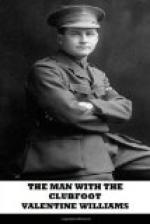A motor-car stood at the door, in it a young man in a grey-blue military great-coat and a flat cap with a pink band round it. He sprang out as we appeared. His manner was most empresse. He completely ignored my companion.
“I am extremely glad to see you, Herr Doktor,” he said. “You are most anxiously expected. I must present my apologies for not being at the station to welcome you, but, apparently, there was some misunderstanding. The arrangements at the station for your reception seem to have broken down completely ...” and he stared through his monocle at the old Major, who flushed with vexation.
“If you will step into my car,” the young man added, “I will drive you to the station. We need not detain this gentleman any longer.”
I felt sorry for the old Major, who had remained silent under the withering insolence of this young lieutenant, so I shook hands with him cordially and thanked him for his hospitality. He was a jovial old fellow after all.
The young Count drove himself and chatted amiably as we whirled through the streets. “I must introduce myself,” he said: “Lieutenant Count von Boden of the 2nd Uhlans of the Guard. I did not wish to say anything before that old chatterbox. I trust you have had a pleasant journey. Von Steinhardt, of our Legation at the Hague, was instructed to make all arrangements for your comfort on this side. But I was forgetting, you and he must be old acquaintances, Herr Doktor!”
I said something appropriate about von Steinhardt’s invariable kindness. Inwardly, I noted the explanation of the visiting card in the portfolio in my pocket.
At the station we found two orderlies, one with my things, the other with von Boden’s luggage and fur pelisse. The platforms were now deserted save for sentries: all life at this dreary frontier station seemed to die with the passing of the mail train.
I could not help noticing, after we had left the car and were strolling up and down the platform waiting for the special, that my companion kept casting furtive glances at my feet. I looked down at my boots: they wanted brushing, certainly, but otherwise I could see nothing wrong with them. They were brown, it is true, and I reflected that the German man about town has a way of regulating his tastes in footgear by the calendar, and that brown boots are seldom worn in Germany after September 1st.
Our special came in, an engine and tender, a brakesman’s van, a single carriage and a guard’s van. The stationmaster bid us a most ceremonious adieu, and the guard, cap in hand, helped me into the train.
It was a Pullman car in which I found myself, with comfortable arm-chairs and small tables. One of the orderlies was laying the table for luncheon, and here, presently, the young Count and I ate a meal, which, save for the inevitable “Kriegsbrod,” showed few signs of the stringency of the British blockade. But by this time I had fully realized that, for some unknown reason, no pains were spared to do me honour, so probably the fare was something out of the common.




